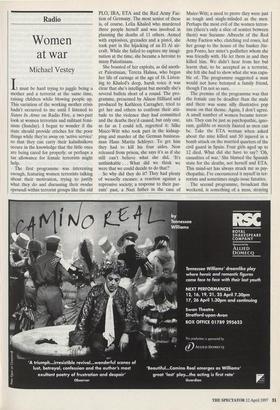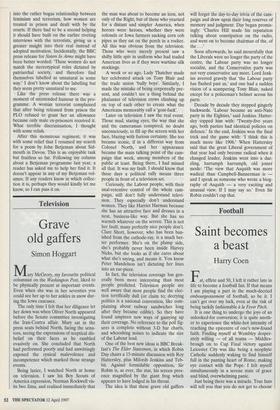Radio
Women at war
Michael Vestey
It must be hard trying to juggle being a mother and a terrorist at the same time, raising children while blowing people up. This variation of the working mother crisis hadn't occurred to me until I listened to Sisters In Arms on Radio Five, a two-part look at women terrorists and militant femi- nism (Sunday). I began to wonder if the state should provide creches for the poor things while they're away on 'active service' so that they can carry their kalashnikovs secure in the knowledge that the little ones are being cared for properly; or perhaps a tax allowance for female terrorists might help.
The first programme was interesting enough, featuring women terrorists talking about their motivation, trying to justify what they do and discussing their modus operandi within terrorist groups like the old PLO, IRA, ETA and the Red Army Fac- tion of Germany. The most senior of these is, of course, Lelia IChaled who murdered three people herself and was involved in planning the deaths of 11 others. Armed with explosives, grenades and a pistol, she took part in the hijacking of an El Al air- craft. While she failed to capture my imagi- nation at the time, she became a heroine to many Palestinians.
She boasted of her exploits, as did anoth- er Palestinian, Tereza Halasa, who began her life of carnage at the age of 16. Listen- ing to Khaled's deep, harsh voice it was clear that she's intelligent but morally she's several bullets short of a round. The pro- gramme, presented by Alison Hilliard and produced by Kathleen Carragher, tried to get her and others to confront their atti- tude to the violence they had committed and the deaths they'd caused, but only one, as far as I could tell, regretted it: Silke Maier-Witt who took part in the kidnap- ping and murder of the German business- man Hans Martin Schleyer. To get him they had to kill his four aides. Now released from prison, she says it's as if she still can't believe what she did, 'It's unthinkable. . . What did we think we were that we could decide to do that?'
So why did they do it? They had plenty of weaselly excuses: a reaction against a repressive society; a response to their par- ents' past, a Nazi father in the case of Maier-Witt; a need to prove they were just as tough and single-minded as the men. Perhaps the most evil of the women terror- ists (there's only a slice of semtex between them) was Suzanne Albrecht of the Red Army Faction who, clutching red roses, led her group to the house of the banker Jiir- gen Ponto, her sister's godfather whom she was friendly with. He let them in and they killed him. We didn't hear from her but learnt that, to be accepted as a terrorist, she felt she had to show what she was capa- ble of. The programme suggested a man would not have betrayed a family friend, though I'm not so sure.
The premise of the programme was that the female can be deadlier than the male and there was some silly illustrative pop music on that theme. Again, I don't agree. A small number of women became terror- ists. They can be just as psychopathic, igno- rant, gullible or merely fixated as men can be. Take the ETA woman when asked about the nine killed and 50 injured in a bomb attack on the married quarters of the civil guard in Spain. Four girls aged up to 12 died. What did she have to say? 'Oh, casualties of war.' She blamed the Spanish state for the deaths, not herself and ETA. This mind-set has always struck me as psy- chopathic. I've encountered it myself in ter- rorists and sometimes single-issue fanatics.
The second programme, broadcast this weekend, is something of a mess, straying into the rather bogus relationship between feminism and terrorism, how women are treated in prison and dealt with by the courts. If there had to be a second helping it should have built on the earlier riveting interviews with the terrorists, giving us a greater insight into their real instead of adopted motivation. Incidentally, the BBC press release for Sisters In Arms might have been better worded: 'These women do not match the stereotypical roles dictated by patriarchal society, and therefore find themselves labelled as unnatural in some way.' I don't know about the labelling but they seem pretty unnatural to me.
Like the press release there was a moment of unintended humour in the pro- gramme. A woman terrorist complained that after being released from prison the PLO refused to grant her an allowance because only male ex-prisoners received it. What terrible discrimination, I thought with some relish.
After this monstrous regiment, it was with some relief that I resumed my search for a poem by John Betjeman about Sid- mouth in Devon. This is an enjoyable task but fruitless so far. Following my column about a Betjeman programme last year, a reader has asked me to help her find it. It doesn't appear in any of my Betjeman vol- umes. If any readers know in which collec- tion it is, perhaps they would kindly let me know, so I can pass it on.



































































 Previous page
Previous page